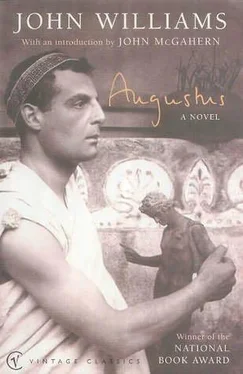John Williams - Augustus
Здесь есть возможность читать онлайн «John Williams - Augustus» весь текст электронной книги совершенно бесплатно (целиком полную версию без сокращений). В некоторых случаях можно слушать аудио, скачать через торрент в формате fb2 и присутствует краткое содержание. Жанр: Историческая проза, на английском языке. Описание произведения, (предисловие) а так же отзывы посетителей доступны на портале библиотеки ЛибКат.
- Название:Augustus
- Автор:
- Жанр:
- Год:неизвестен
- ISBN:нет данных
- Рейтинг книги:3 / 5. Голосов: 1
-
Избранное:Добавить в избранное
- Отзывы:
-
Ваша оценка:
- 60
- 1
- 2
- 3
- 4
- 5
Augustus: краткое содержание, описание и аннотация
Предлагаем к чтению аннотацию, описание, краткое содержание или предисловие (зависит от того, что написал сам автор книги «Augustus»). Если вы не нашли необходимую информацию о книге — напишите в комментариях, мы постараемся отыскать её.
Augustus — читать онлайн бесплатно полную книгу (весь текст) целиком
Ниже представлен текст книги, разбитый по страницам. Система сохранения места последней прочитанной страницы, позволяет с удобством читать онлайн бесплатно книгу «Augustus», без необходимости каждый раз заново искать на чём Вы остановились. Поставьте закладку, и сможете в любой момент перейти на страницу, на которой закончили чтение.
Интервал:
Закладка:
After the Parthian debacle, Antonius sent to the Senate a dispatch describing his "victory" in the most glowing and general terms; and demanded, though in absentia, the ceremony of a triumph. We accepted the lie, allowed it currency, and gave him his triumph.
Italy had been racked by two generations of civil wars; the immediate history of a strong and proud people was a history of defeat, for none is victor in a civil strife; after the defeat of Sextus Pompeius, peace seemed possible; the news of such an overwhelming defeat might have been simply catastrophic, both to the stability of our government and to the soul of the people. For a people may endure an almost incredible series of the darkest failures without breaking; but give them respite and some hope for the future, and they may not endure an unexpected denial ofthat hope.
And there were more particular reasons for the lie. The defeat of Sextus Pompeius had been accomplished only shortly before we got the news from Parthia; the auxiliary legions had been disbanded and settled on the lands promised them; the prospect that they might be called again would have wholly disrupted all land values outside of Rome, and would have proved disastrous to an already precarious economy.
Finally, and most obviously, we still had some hope that Antonius might be deflected from his Eastern dream of Empire and become once again a Roman. It was a vain hope, but at that time it seemed a reasonable one. To have refused him his triumph-to have told your "truth" to all of Rome-would have made it impossible for him ever to have returned in honor or in peace.
In my account of these events, I have been saying "we;” but you must understand that for nearly three years after the defeat of Sextus Pompeius, Octavius and Agrippa were only occasionally in Rome; most of their time was spent in Illyria, securing our borders and subduing the barbarian tribes that theretofore had ranged freely up and down the Dalmatian shore-lands, and had even pillaged villages on the Adriatic coast of Italy itself. During this time I was entrusted with the official seal of Octavius. These decisions were mine, though in every instance, I am proud to say, they were approved by the Emperor, though often after the fact. I remember once he returned to Rome, briefly, to recuperate from a wound received in a battle against one of the Illyrian tribes; and he said to me, only half-jokingly, I think, that with Agrippa at the head of his army and with me, however unofficially, at the head of his government, he felt that the security of the nation demanded that he relinquish any pretense to either position, and for his own pleasure become the head of my stable of poets.
Marcus Antonius… The charges and countercharges that have come down through the years! But beneath them, the truth was there, though the world may never fully apprehend it. We played no game; we had no need to. Though many senators in Rome, being of the old Party and somehow irrationally reversing allegiances and seeing Antonius as the only hope of recapturing the past, we knew to be against us and for Antonius, yet the people were for us; we had the army; and we had sufficient senatorial power to carry at least the most important of our edicts.
We could have endured Marcus Antonius in the East as an independent satrap or Imperator or whatever he chose to call himself, so long as he remained a Roman, even a plundering Roman; we could have endured him in Rome, even with his recklessness and ambition. But it was being forced upon us that he had caught the dream of the Greek Alexander, and that he was sick from that dream.
We gave him his triumph; it strengthened his senatorial support, but it did not draw him back to Rome. We offered him the consulship; he refused it, and did not return to Rome. And in what was really a last desperate effort to avert what we knew was coming, we returned to him the seventy ships of his fleet that had helped us defeat Sextus Pompeius, and we sent two thousand troops to augment his depleted Roman legions. And Octavia sailed with the fleet and soldiers to Athens, in the hope that Antonius might be dissuaded from his awful ambition and return to his duty as husband, Roman, and triumvir.
He accepted the ships; he enlisted the troops; and he refused to see Octavia, nor even gave her dwelling in Athens, but sent her forthwith back to Rome. And as if to leave no doubt in the minds of any of his contempt, he staged a triumph in Alexandria -in Alexandria-and presented a few token captives, not to a Senate, but to Cleopatra, a foreign monarch, who sat above even Antonius himself and upon a golden throne. It is said that a most barbaric ceremony followed the triumph-Antonius robed himself as Osiris, and sat beside Cleopatra, who was gowned as Isis, that most peculiar goddess. He proclaimed his mistress to be Queen of Kings, and proclaimed that her Caesarion was joint monarch over Egypt and Cyprus. He even had struck coins on one side of which was a likeness of himself and on the other a likeness of Cleopatra.
As if it were an afterthought, he had sent to Octavia letters of divorce, and had her evicted without ceremony or warning from his Roman dwelling.
We could not then evade what must ensue. Octavius returned from Illyria, and we began to prepare for whatever madness might come from the East.
IX Senatorial Proceedings, Rome (33 B. c.)
On this day Marcus Agrippa, Consular and Admiral of the Roman Fleet, Aedile of the Roman Senate, does declare, for the health and welfare of the Roman people, and for the glory of Rome, the following:
I From his own funds, and without recourse to the public treasury, Marcus Agrippa will have repaired and restored all public buildings that have fallen into neglect, and will have cleaned and repaired the public sewers that carry the waste of Rome into the Tiber.
II From his own funds Marcus Agrippa will make available to all free-born inhabitants of Rome sufficient olive oil and salt to suffice their needs for one year.
III For both men and women, free-born and slave, the public baths will for the period of one year be open for use without fee.
IV To protect the gullible and ignorant and poor, and to halt the spread of alien superstition, all astrologers and Eastern soothsayers and magicians are forbidden within the city walls, and those who now practice their vicious trades are ordered to quit the city of Rome, upon pain of death and forfeiture of all monies and properties.
V. In that Temple known as Serapis and Isis, the trinkets of Egyptian superstition shall no longer be sold or purchased, upon pain of exile for both purchaser and seller; and the Temple itself, built to commemorate the conquest of Egypt by Julius Caesar, is declared to be a monument of history, and not a recognition of the false gods of the East by the Roman people and the Roman Senate.
X. Petition: the Centurion Quintus Appius to Munatius Plancus, Commander of the Asian Legions of the Imperator Marcus Antonius, from Ephesus (32 B. c.)
I, Appius, son of Lucius Appius, am of the Cornelian tribe and of Campanian origin. My father was a farmer, who left me a few acres of land near Velletri, which from the age of eighteen to twenty-three I tilled for a humble livelihood. My cottage is there yet, overseen by the wife I married in my youth, who, though a freedwoman, is chaste and faithful; and the land is tended by the three of my sons who remain alive. Two sons I lost-one to disease, and the eldest to the Spanish campaign against Sextus Pompeius, under Julius Caesar, these many years ago.
For the sake of Italy and my posterity, I became a soldier in the twenty-third year of my life, in the consulship of Tullius Cicero and Gaius Antonius, who was uncle to the Marcus Antonius who is now my master. For two years I was a common soldier in that army under Gaius Antonius which defeated in honorable battle the conspirator Catiline; in my third year as a soldier I was with Julius Caesar in his first Spanish campaign, and though I was a young man, in reward for my bravery in battle, Julius Caesar made me a lesser centurion of the IV Macedonian legion. I have been a soldier for thirty years; I have fought in eighteen campaigns, in fourteen of which I was centurion and in one of which I was acting military tribune; I have fought under the command of six duly elected consuls of the Senate; I have served in Spain, Gaul, Africa, Greece, Egypt, Macedonia, Britain, and Germany; I have marched in three triumphs, I have five times received the laurel crown for saving the life of a fellow soldier; and I have twenty times been decorated for bravery in battle.
Читать дальшеИнтервал:
Закладка:
Похожие книги на «Augustus»
Представляем Вашему вниманию похожие книги на «Augustus» списком для выбора. Мы отобрали схожую по названию и смыслу литературу в надежде предоставить читателям больше вариантов отыскать новые, интересные, ещё непрочитанные произведения.
Обсуждение, отзывы о книге «Augustus» и просто собственные мнения читателей. Оставьте ваши комментарии, напишите, что Вы думаете о произведении, его смысле или главных героях. Укажите что конкретно понравилось, а что нет, и почему Вы так считаете.











